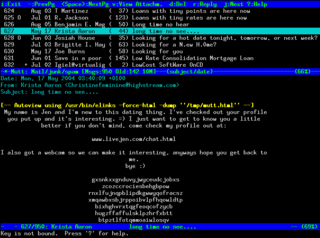
The Apache HTTP Server is a free and open-source cross-platform web server software, released under the terms of Apache License 2.0. It is developed and maintained by a community of developers under the auspices of the Apache Software Foundation.

CUPS is a modular printing system for Unix-like computer operating systems which allows a computer to act as a print server. A computer running CUPS is a host that can accept print jobs from client computers, process them, and send them to the appropriate printer.

Mutt is a text-based email client for Unix-like systems. It was originally written by Michael Elkins in 1995 and released under the GNU General Public License version 2 or any later version.

The Bat! is an email client for the Microsoft Windows operating system, developed by Moldovan software company Ritlabs. It is sold as shareware and offered in three editions: Home Edition, Professional Edition, and Voyager which is a portable version and is included with Professional Edition.

Pegasus Mail is a proprietary email client for Microsoft Windows. It was originally released in 1990 on NetWare networks with MS-DOS and later Apple Macintosh clients, before being ported to Windows which is now the only platform actively supported. Since its inception it has been developed by David Harris and is donationware after having previously been freeware.

AWStats is an open source Web analytics reporting tool, suitable for analyzing data from Internet services such as web, streaming media, mail, and FTP servers. AWStats parses and analyzes server log files, producing HTML reports. Data is visually presented within reports by tables and bar graphs. Static reports can be created through a command line interface, and on-demand reporting is supported through a Web browser CGI program.

Kontact is a personal information manager and groupware software suite developed by KDE. It supports calendars, contacts, notes, to-do lists, news, and email. It offers a number of inter-changeable graphical UIs all built on top of a common core.
The following tables compare general and technical features of notable email client programs.

Outlook on the web is a personal information manager web app from Microsoft. It is a web-based version of Microsoft Outlook, and is included in Exchange Server and Exchange Online
The Internet Messaging Program or IMP is a webmail client. It can be used to access e-mail stored on an IMAP server. IMP is written in PHP and a component of the collaborative software suite Horde.

Zimbra Collaboration, formerly known as the Zimbra Collaboration Suite (ZCS) before 2019, is a collaborative software suite that includes an email server and a web client.

Roundcube is a web-based IMAP email client. Roundcube's most prominent feature is the pervasive use of Ajax technology. Roundcube is free and open-source software subject to the terms of the GNU General Public License (GPL-3.0-or-later), with exceptions for skins and plugins.
A webform, web form or HTML form on a web page allows a user to enter data that is sent to a server for processing. Forms can resemble paper or database forms because web users fill out the forms using checkboxes, radio buttons, or text fields. For example, forms can be used to enter shipping or credit card data to order a product, or can be used to retrieve search results from a search engine.

Citadel is a collaboration suite that is directly descended from the Citadel family of programs which became popular in the 1980s and 1990s as a bulletin board system platform. It is designed to run on open source operating systems such as Linux or BSD. Although it is being used for many bulletin board systems, in 1998 the developers began to expand its functionality to a general purpose groupware platform.
The comparison of mail servers covers mail transfer agents (MTAs), mail delivery agents, and other computer software that provide e-mail services.

Zarafa was an open-source groupware application that originated in the city of Delft in the Netherlands. The company that developed Zarafa, previously known as Connectux, is also called Zarafa. The Zarafa groupware provided email storage on the server side and offered its own Ajax-based mail client called WebAccess and a HTML5-based, WebApp. Advanced features were available in commercially supported versions. Zarafa has been superseded by Kopano.

Apache James, a.k.a. Java Apache Mail Enterprise Server or some variation thereof, is an open source SMTP and POP3 mail transfer agent written entirely in Java. James is maintained by contributors to the Apache Software Foundation, with initial contributions by Serge Knystautas. IMAP support has been added as of preview version 3.0-M2, which now requires Java 1.5 or later.
mod_gzip is an external extension module for the Apache HTTP Server v1 and v2.
Exchange ActiveSync is a proprietary protocol designed for the synchronization of email, contacts, calendar, tasks, and notes from a messaging server to a smartphone or other mobile devices. The protocol also provides mobile device management and policy controls. The protocol is based on XML. The mobile device communicates over HTTP or HTTPS.

ownCloud is a free and open-source software project for content collaboration and sharing and syncing of files in distributed and federated enterprise scenarios. It allows companies and remote end-users to organize their documents on servers, computers, and mobile devices and work with them collaboratively while keeping a centrally organized and synchronized state.












